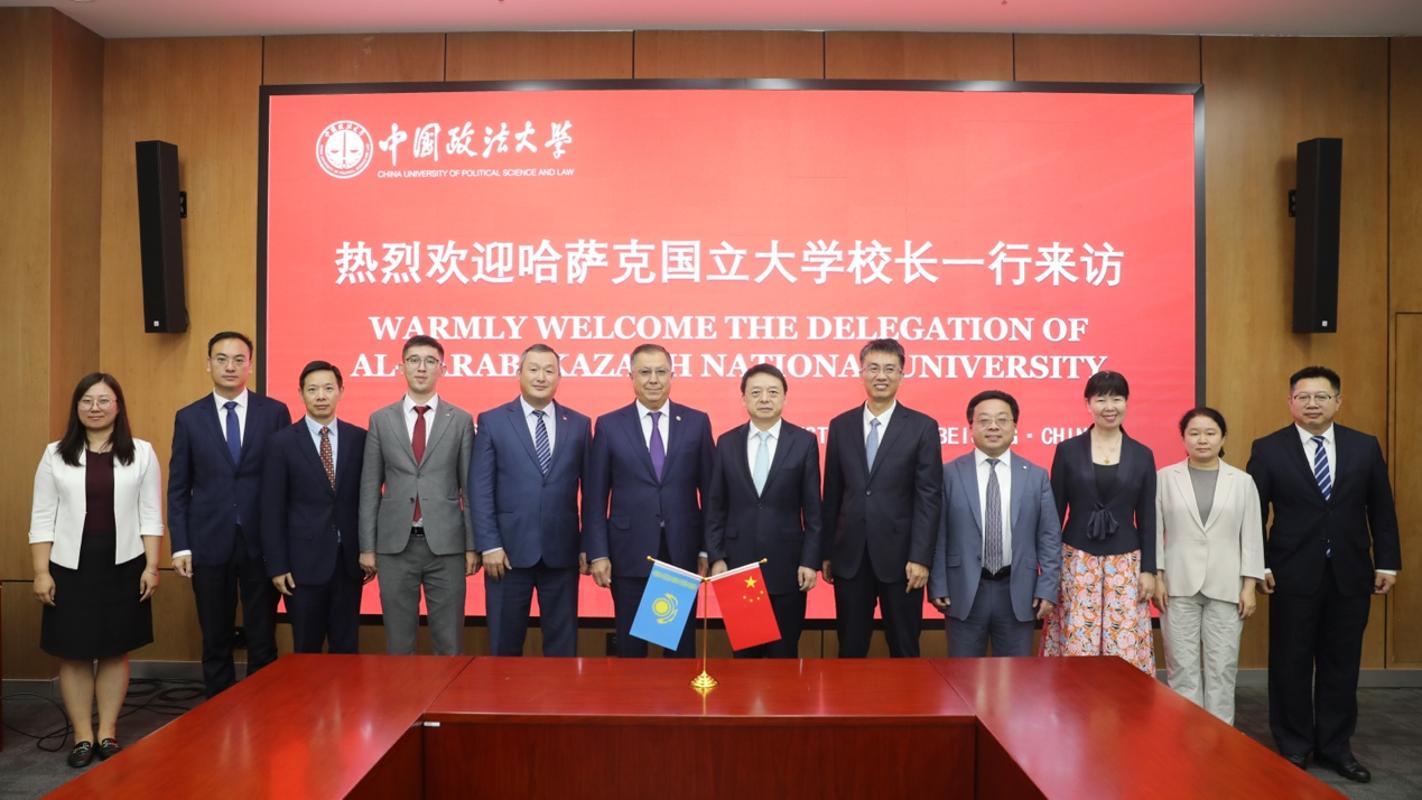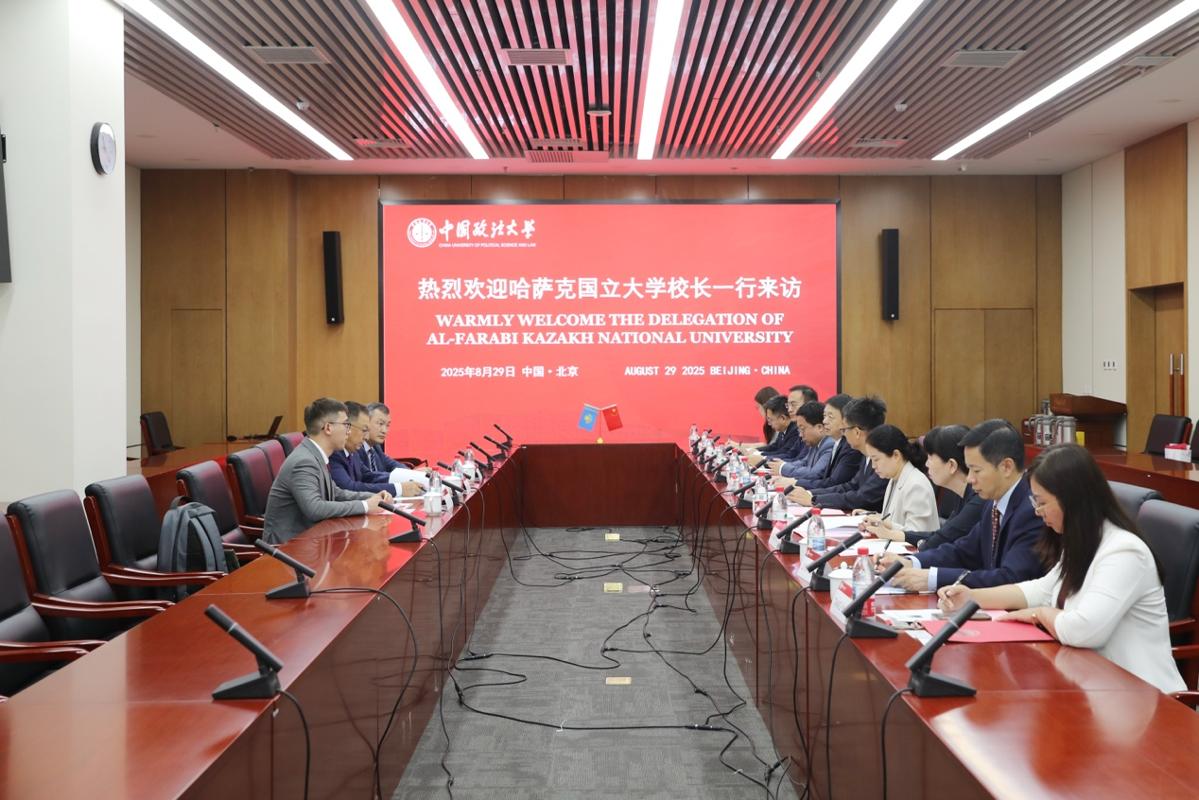On August 29, a delegation from Al-Farabi Kazakh National University(AFKNU), led by its President, former Minister of Education and Science of the Republic of Kazakhstan, Tuimebayev Zhanseit Kanseituly, visited China University of Political Science and Law (CUPL).

Council Chair Jiang Zeting met with the delegation and recalled his visit to Al-Farabi Kazakh National University earlier this May. He noted that amid the deepening China-Kazakhstan relations and increasingly close economic and trade ties, enhancing collaboration between the two universities is of particular importance. He stressed that cooperation between governments, universities, and enterprises is a prevailing trend for the future. He further highlighted that cultivating high-level legal professionals with a global vision and deep understanding of international rules is not only a shared goal of both universities, but also a concrete step to implement the consensus reached by the two heads of state. Acknowledging AFKNU as a leading institution in Kazakhstan and Central Asia, renowned for its outstanding achievements in talent training and scientific research, CUPL stands ready to work hand in hand with AFKNU. Building on the establishment of the “China–Central Asia Legal Education Alliance,” the two universities will advance joint research and talent cultivation in cutting-edge fields such as artificial intelligence and the rule of law, thereby contributing to modern technology governance and mutual learning in civilization of rule of law between the two countries.

On the same day, President Ma Huaide held talks with Tuimebayev and his delegation at the Haidian Campus. Lu Chunlong and Yu Fei attended the event. President Ma extended a warm welcome and gave a detailed overview of CUPL’s history, disciplinary development, talent cultivation, and international exchange. He emphasized that President Xi Jinping’s proposal of the “China–Central Asia Spirit” provides clear guidance for bilateral cooperation. CUPL attaches great importance to collaboration with universities in Central Asia, and recognizes AFKNU as a highly prestigious institution both within the region and globally. CUPL is willing to co-initiate the “China–Central Asia Legal Education Alliance” and to carry out joint research and talent training in areas such as foreign-related rule of law, national security, and artificial intelligence. In addition, CUPL will actively leverage the Institute of Law-based Governance of Xinjiang and the Data Law Lab to establish a “China–Kazakhstan Research Center on Artificial Intelligence and Civilization of Rule of Law,” further deepening area studies and fostering a high-level, sustainable, and institutionalized framework for practical cooperation.
During the visit, Tuimebayev expressed his gratitude for CUPL’s warm reception. He noted that he was honored to visit China’s top institution of legal education while accompanying the President of Kazakhstan on his visit to China. He introduced AFKNU’s achievements in talent training, scientific research, disciplinary development, and cooperation with China. He emphasized the deep friendship between China and Kazakhstan, pointing out that China is Kazakhstan’s largest trading partner and promoting the rule of law is a shared responsibility of the two universities. AFKNU attaches great importance to cooperation with CUPL and stands ready to carry out in-depth collaboration in fields such as law, artificial intelligence, and regional governance, with the aim of cultivating high-quality legal professionals and providing intellectual support for cooperation between the two governments and enterprises.

Participants of the event included Yesbol Omirzhanov, Director of International Cooperation Department of AFKNU ; Arda Auelkhan, Senior Specialist of Global Partnership Office; Li Weihai, Dean of the Institute of Law-based Governance of Xinjiang of CUPL; Wang Limei, Professor at the Data Law Lab; Li Qunying, Professor of School of Political Science and Public Administration; Zhang Hongzhe, Director of the Office of Development Planning and Discipline Development; and Lyu Yong, Director of the Office of International Cooperation and Exchange.

